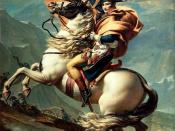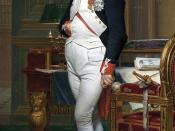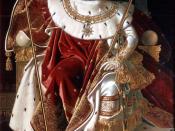The enlightenment was a time of great learning throughout Europe during the eighteenth century. Although the period is significant for scientific and other scholastic advancements, it is most important because it allowed for the opening of great minds--such as that of Napoleon Bonaparte. Shortly after this enlightenment made its way through Europe, revolution and civil war ripped through France between 1879 and 1899. The unrest of the time called for a strong ruler. A man/woman with an open mind and an enlightened soul. France needed a child of the enlightenment to sew its tattered flag. Napoleon Bonaparte was a child of the enlightenment. This was displayed in both his attitudes and policies as a result of enlightened religious ideas, political genius, and social reforms. Almost every ruler in history can be accused of having some kind of religious fanaticism. This religious fervor has led to persecution, civil war, unrest, instability, ignorance, and even genocide.
The enlightenment taught philosophers and scholars religious tolerance by lessening the importance of religion and God in everyday life. As a child of the enlightenment, Napoleon had a similar immunization to the devout and was able to use religion as a tool to accomplish his political ideas and goals. An example of this is the fact that whatever new land he conquered, he adopted the religion of that land in order to gain the acceptance of the general population. In France, he was Catholic. In Egypt, he was Muslim. But the only insight we have to his actual religious beliefs are that he said he followed his own star indicating that he pursued a somewhat mystical belief in destiny and fate. He completely regarded the church as a convenience to be taken advantage of by any enlightened despot. When he first came to power, the...


